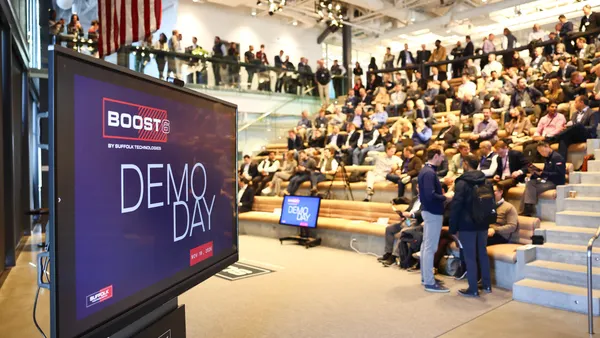Dive Brief:
- The latest Digital Disruption Index by Deloitte, which surveyed 158 executives in the U.K., revealed an increase in the perception that students who leave school or graduate have the right digital skills and experience to join the workforce. The report highlighted an 18% agreement among survey respondents, up from 12% six months ago.
- Also on the rise is the perception by leaders that existing employees have the digital talent to execute their company's digital strategy. The survey's numbers showed 25% of leaders have this confidence, up from 16% in the spring of last year.
- A majority of respondents, 75%, said they believe AI, robotics and internet of things are making fundamental changes within their organization. They suggested more will need to be done to keep up with the adoption of new and upcoming technologies in the workplace.
Dive Insight:
The digital skills gap may be shrinking as leaders see more technology-apt workers entering the workforce — but businesses still have work to do. For workers who aren't getting the training they want and need from their employers, many are taking learning into their own hands. The risk, though, is that employees will leave once they've boosted their skill sets.
To combat this, a number of construction companies have prioritized learning and development programs within their organizations in order to grow talent from within and to keep these individuals on board. For example, Birmingham, Alabama-based Hoar Construction, Construction Dive's 2018 Company of the Year, boasts high tenure rates which it attributes to a strong program of career training.
In addition to exposure to the "technical aspects of the construction business, from safety to quality to schedule," Hoar President Turner Burton told Construction Dive the general contractor offers opportunities to experiment with emerging technologies like bricklaying robots and guidance on soft skills like communication and presentation.
In construction management bachelor's and master's programs across the country, delving into BIM software, virtual reality and reality capture tools, for example, is becoming the norm. And in many cases, students who are hired out of such programs are eager to drive forward use of these technologies at their companies.
Boston-based Suffolk Construction recognized that while these young people will need to learn the finer aspects of the business with time and grade, they can offer know-how and comfort with emerging technologies to even their most senior colleagues. The company used a "reverse-mentor" program on one of its projects, where recent graduates were able to lead a 3D scanning effort to catch discrepancies between the building and its model, in exchange for management and strategy tips from an experienced superintendent.













